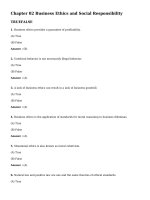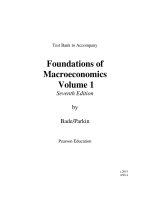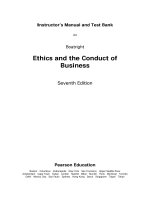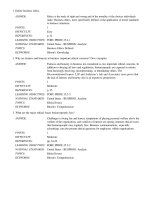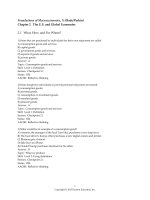Ethics and the conduct of business 7th edition boatright test bank
Bạn đang xem bản rút gọn của tài liệu. Xem và tải ngay bản đầy đủ của tài liệu tại đây (110.23 KB, 10 trang )
Instructor’s Manual and Test Bank
for
Boatright
Ethics and the Conduct of
Business
Seventh Edition
Pearson Education
Boston Columbus Indianapolis New York San Francisco Upper Saddle River
Amsterdam Cape Town Dubai London Madrid Milan Munich Paris Montreal Toronto
Delhi Mexico City Sao Paulo Sydney Hong Kong Seoul Singapore Taipei Tokyo
Copyright © 2012, 2009, 2007 Pearson Education, Inc., One Lake Street, Upper Saddle River, NJ
07458. All rights reserved. Manufactured in the United States of America. The contents, or parts
thereof, may be reproduced with Ethics and the Conduct of Business, Seventh Edition, by John R.
Boatright, provided such reproductions bear copyright notice, but may not be reproduced in any form
for any other purpose without written permission from the copyright owner. To obtain permission(s) to
use material from this work, please submit a written request to Pearson Education, Inc., Permissions
Department, One Lake Street, Upper Saddle River, New Jersey 07458 or you may fax your request
to 201-236-3290.
10 9 8 7 6 5 4 3 2 1
16 15 14 13 12
ISBN-10: 0-20-505340-8
ISBN-13: 978-0-205-05340-7
Contents
Chapter 1
Ethics in the World of Business
1
Chapter 2
Ethical Decision Making
4
Chapter 3
Ethical Theories
7
Chapter 4
Whistle-Blowing
10
Chapter 5
Trade Secrets and Conflict of Interest
13
Chapter 6
Privacy
17
Chapter 7
Discrimination and Affirmative Action
20
Chapter 8
Employment Rights
23
Chapter 9
Occupational Health and Safety
26
Chapter 10
Marketing, Advertising, and Product Safety
30
Chapter 11
Ethics in Finance
33
Chapter 12
Corporate Social Responsibility
37
Chapter 13
Corporate Governance and Accountability
40
Chapter 14
International Business Ethics
43
© 2012 Pearson Education, Inc. All Rights Reserved.
iii
Chapter 1
Ethics in the World of Business
CHAPTER SUMMARY
Business ethics is concerned with identifying and understanding the ethical issues that arise
in business and with developing the knowledge and skills needed by a practicing manager to
address these issues and to make sound business decisions—that is, decisions that are
sound from both an ethical and a business perspective. Ethical issues are an inevitable
element of business decision making and are deeply intertwined with managerial practice
and economic activity generally. Business ethics is important for managers because many
business decisions upon which the success of individual managers, business organizations,
and, indeed, the whole economic system depend, are involved in ethical issues. Both
economics and law are important guides for business decision making, but they are not
complete. Nor is business ethics understood merely as the treatment of ethical issues from
a philosophical perspective. As the work of psychologists and sociologists on organizational
misconduct show, it is not enough merely to determine a right course of action. Misconduct
in organizations is also the result of flaws in individual and organizational decision making
that can be corrected only by changes in decision-making processes. Practicing managers
must also address the larger challenge of preventing misconduct within organizations.
CHAPTER OBJECTIVES
•
•
•
Explain how business decision-making can run afoul of ethical concerns.
Describe the kinds of decisions that are characteristic of the various levels of
business organization.
Describe the relationship between ethics and the law.
SUGGESTED DISCUSSION PROMPTS
1. What types of ethical concerns do decision-makers at the management level need to
take into account?
2. What types of ethical concerns do decision-makers at lower organizational levels
need to take into account?
3. How would you respond to someone who says that a business should always do
whatever is in its economic interests?
4. What is wrong with the thought that abiding by the law is all the ethics that a
businessperson needs to worry about?
5. How does specialized knowledge come into play in the management of ethics?
© 2012 Pearson Education, Inc. All Rights Reserved.
1
ASSESSMENT FOR IN-CLASS USE
The following assessment has been created for in-class use. This assessment may be
available through Pearson’s MyTest website—allowing for easy access for creating your own
tests. This assessment may also be offered in a Blackboard/Angel/D2L/WebCT package.
Please contact your local Pearson sales representative to learn about the options available.
Visit, />
Multiple Choice Questions
Difficulty: 1 = Easy; 2 = Medium; 3 = Challenging
Choose the BEST possible answer for each of the following.
1.
In many cases, rules of business ethics can be determined by _______.
A. applicable laws
B. company guidelines
C. economic requirements
D. rules of conduct that apply in everyday life
Answer: D
2.
The economic character of business can be seen in its _______.
A. trading characteristics
B. ethical dimensions
C. personal aspects
D. legal guidelines
Answer: A
3.
Organization in business is characterized mainly by its _______.
A. rules
B. hierarchy
C. profits
D. products
Answer: B
4.
Decision making in business occurs at various distinctive _______.
A. places
B. levels
C. objectives
D. profits
Answer: B
5.
It is possible for there to be unethical actions that are not _______.
A. illegal
B. wrong
C. avoidable
D. harmful
Answer: A
© 2012 Pearson Education, Inc. All Rights Reserved.
2
6.
Economic reasoning describes how we _______.
A. ought to reason
B. prioritize our desires
C. reason when pursuing our goals
D. would reason if we could have whatever we wanted
Answer: C
7.
Adam
A.
B.
C.
D.
Smith’s economic theory is based on which of the following assumptions?
People want to promote each others’ interests.
Morality is not relevant to economic concerns.
Free markets will fix their own ethical problems.
People will behave rationally as they pursue their interests.
Answer: D
8.
What fact does the “ultimatum bargaining game” demonstrate?
A. It is often rational to price products below their market value.
B. Free markets will usually self-regulate.
C. Many people do not understand economics.
D. Many people would rather not trade than be treated unfairly.
Answer: D
9.
The school of thought that says that law and ethics govern two different realms is
wrong because _______.
A. ethics applies to every field of life
B. anything that is legal is also ethical
C. anything that is illegal is also unethical
D. the law governs every aspect of life
Answer: A
10.
It is not ethically sufficient to obey the law because _______.
A. the law does not apply to business in general
B. ethical constraints sometimes require that the law be ignored
C. ethics goes beyond what can be legally codified
D. the law itself is stricter than ethics
Answer: C
Essay Questions
1. What is economic efficiency, and in what ways might the pursuit of economic
efficiency be unethical?
2. Describe and explain an example of a business decision that would be unethical even
though it is legal.
3. In what ways does it benefit businesses to pursue ethical choices beyond what they
are legally required to do?
© 2012 Pearson Education, Inc. All Rights Reserved.
3
Chapter 2
Ethical Decision Making
CHAPTER SUMMARY
Ethical decision making in business is often difficult and complex. Some situations are easily
handled because what one ought to do or what is right and wrong are evident. Those
situations that give us pause or produce moral anguish require careful thought and
ultimately an ability to engage in ethical reasoning. This chapter contributes to an
understanding of ethical decision making by offering a division of business ethics into two
parts: an ethics of the market and an ethics of roles and relationships, including firms. In
business, we deal with some parties purely as market actors who are on the other side of a
market transaction or exchange. For such market activity, certain moral rules or standards
apply. Much of business, however, involves roles and relationships and takes place in firms
or organizations. These roles, relationships, and firms arise in a market, but, by mutual
agreement in a market, we take ourselves out of the market and govern our actions by a
different “ethics,” the ethics of these roles and relationships.
When we attempt to think through the ethical issues that arise in business, we are engaging
in ethical reasoning, which may be conducted on different levels. Ethical theories, which are
presented in the next chapter, can guide ethical reasoning on the highest level by providing
the most comprehensive and fundamental grounds for our moral beliefs and judgments.
Fortunately, substantial moral arguments can be constructed that do not require an
understanding of these theories. Most of our everyday ethical reasoning employs familiar
ethical concepts and principles that can be readily understood and applied. Accordingly, this
chapter provides a framework of seven basic ethical principles that are sufficient for most
business decision making. For those who seek more, though, the next chapter provides a
survey of the main philosophical theories of ethics.
CHAPTER OBJECTIVES
•
•
•
•
Identify the ethical duties and obligations of business that arise from the market.
Identify the ethical duties and obligations of business that arise from roles and
relationships.
Describe the philosophical bases of ethical reasoning.
Describe the psychological bases of ethical reasoning.
SUGGESTED DISCUSSION PROMPTS
1. What is ethically required of participants in a market economic system?
2. In what ways do participants in a market system have to depend upon each other?
3. In what ways do ethical considerations work against perfect operation of a market
economy?
4. How does the prisoner’s dilemma reflect the limitations of a free market system?
5. What capacities are required of an agent to engage in ethical reasoning?
© 2012 Pearson Education, Inc. All Rights Reserved.
4
ASSESSMENT FOR IN-CLASS USE
The following assessment has been created for in-class use. This assessment may be
available through Pearson’s MyTest website—allowing for easy access for creating your own
tests. This assessment may also be offered in a Blackboard/Angel/D2L/WebCT package.
Please contact your local Pearson sales representative to learn about the options available.
Visit, />
Multiple Choice Questions
Difficulty: 1 = Easy; 2 = Medium; 3 = Challenging
Choose the BEST possible answer for each of the following.
1.
A market economy is based fundamentally on _______.
A. ethical motivations
B. the profit motive
C. human welfare
D. manufacturing
Answer: B
2.
A market with perfect competition would require _______.
A. agents to not be rational
B. that there be no contracts
C. that ethics not be necessary
D. ethical guidelines to be legally codified
Answer: C
3.
Fraud is unethical because _______.
A. all parties must have access to pertinent information
B. no one may be permitted to profit too much
C. market economies require freedom of action
D. the market requires everyone to further their own interests
Answer: A
4.
The difference between Homo economicus and actual people is that _______.
A. Homo economicus is capable of making any decision
B. Homo economicus pursues many different interests
C. actual people pursue their own self-interest
D. actual people are less than perfectly rational
Answer: D
5.
A market economy alone cannot sustain public goods because _______.
A. no one would want to take advantage of public goods
B. everyone would be free riders if they could be
C. people would try to sell each other public goods
D. participants in a market economy are imperfectly rational
Answer: B
© 2012 Pearson Education, Inc. All Rights Reserved.
5
6.
Market outcomes lead to unequal outcomes mainly because _______.
A. it involves random processes
B. participants have differing levels of skill
C. free markets are inherently unjust
D. there is government interference
Answer: B
7.
A fiduciary has the special responsibility to _______.
A. care for another’s financial interests
B. sell goods as efficiently as possible
C. provide as much information as possible
D. take a professional interest in another’s success
Answer: A
8.
The ethical requirements that are specific to professionals arise in part from
_______.
A. their duty not to profit at others’ expense
B. the implicit contract that they have with other professionals
C. the duties they owe to their governing association
D. their specialized knowledge and responsibilities
Answer: D
9.
The internal workings of firms are founded on _______.
A. markets
B. agents
C. roles
D. relationships
Answer: D
10.
The ethical concept of dignity most centrally involves _______.
A. treating all persons equally
B. disclosing all information that is needed by others
C. recognizing the intrinsic value of persons or other entities
D. behaving with high standards of virtue
Answer: C
Essay Questions
1. What are the basic components of a market system, and what assumptions are made
about human behavior?
2. What is the difference between a fiduciary and an agent? What special obligations
are characteristic of a fiduciary that is not an agent?
3. What are the required components of the moral point of view, and how are they
exercised in a business setting?
© 2012 Pearson Education, Inc. All Rights Reserved.
6


